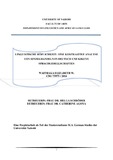| dc.description.abstract | Politeness has been and still is an area of interest to many researchers. The connection drawn between saying things like thank you and welcome at the end of every request and service to politeness fuelled this research. The disconnect as to what politeness is and isn’t calls for delving into other areas that may account for politeness strategies that aren’t conventional. As a result, this study aims to contribute to the pool of knowledge regarding politeness strategies. In order to achieve this, this study aimed at analysing conversations in service encounters in both German and Gikuyu settings and a comparison of the two was done, based on the Relevance theory by Wilson and Sperber (1997) and the Solidarity and Distance hypothesis introduced by Schlund (2014). Wilson and Sperber (1997) relate meaning to cognition, stating that the human mind has a natural tendency to maximise relevance and in turn, speakers unknowingly use particular impulses to direct the hearer towards their intended meaning. In addition, language use is attached to culture. In this regard, cultural meanings are developed as a result of repetitive actions as information is automatically stored in the brain and when within a similar context, the information is recalled and used. In this light, the solidarity and distance hypothesis contributes to the role of context and culture and its relation to meaning. The disconnect between the realisation of politeness that leads to the assumption that some communities are either too polite or not polite or adequately polite can be explained using the distance and solidarity hypothesis. Distance cultures express their politeness using explicit means, direct statements and fixed expressions whereas within solidarity cultures, politeness is implied. The different strategies were outlined, including the evident use of the lexicon and the subjunctive to make requests in German and the collective ‘we’ as was noted in Gikuyu. A general conclusion was arrived at, that both cultures are polite and it is their cultural differences that account for the different strategies they employ. | en_US |

